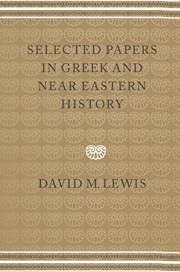Book contents
- Frontmatter
- Contents
- List of plates
- Preface
- Systems of reference
- GENERAL
- ATHENIAN
- 9 Public property in the city
- 10 Cleisthenes and Attica
- 11 Review of J. S. Traill, The Political Organization of Attica
- 12 Review of P. Siewert, Die Trittyen Attikas und die Heeresreform des Kleisthenes
- 13 The Kerameikos ostraka
- 14 Megakles and Eretria
- 15 The Athenian Coinage Decree
- 16 Athena's robe
- 17 The treaties with Leontini and Rhegion
- 18 Entrenchment-clauses in Attic decrees
- 19 Apollo Delios
- 20 After the profanation of the Mysteries
- 21 Aristophanes and politics
- 22 Who was Lysistrata?
- 23 A note on IG i2114 [= i3105]
- 24 The epigraphical evidence for the end of the Thirty
- 25 The financial offices of Eubulus and Lycurgus
- 26 The dating of Demosthenes' speeches
- 27 Law on the Lesser Panathenaia
- 28 The Athenian Rationes Centesimarum
- 29 The chronology of the Athenian New Style Coinage
- 30 Review of M. Thompson, The New Style Silver Coinage of Athens
- NEAR EASTERN
- Bibliography
- Publications of David M. Lewis
- Indexes
17 - The treaties with Leontini and Rhegion
Published online by Cambridge University Press: 15 January 2010
- Frontmatter
- Contents
- List of plates
- Preface
- Systems of reference
- GENERAL
- ATHENIAN
- 9 Public property in the city
- 10 Cleisthenes and Attica
- 11 Review of J. S. Traill, The Political Organization of Attica
- 12 Review of P. Siewert, Die Trittyen Attikas und die Heeresreform des Kleisthenes
- 13 The Kerameikos ostraka
- 14 Megakles and Eretria
- 15 The Athenian Coinage Decree
- 16 Athena's robe
- 17 The treaties with Leontini and Rhegion
- 18 Entrenchment-clauses in Attic decrees
- 19 Apollo Delios
- 20 After the profanation of the Mysteries
- 21 Aristophanes and politics
- 22 Who was Lysistrata?
- 23 A note on IG i2114 [= i3105]
- 24 The epigraphical evidence for the end of the Thirty
- 25 The financial offices of Eubulus and Lycurgus
- 26 The dating of Demosthenes' speeches
- 27 Law on the Lesser Panathenaia
- 28 The Athenian Rationes Centesimarum
- 29 The chronology of the Athenian New Style Coinage
- 30 Review of M. Thompson, The New Style Silver Coinage of Athens
- NEAR EASTERN
- Bibliography
- Publications of David M. Lewis
- Indexes
Summary
Ruschenbusch attempts to strengthen the view of Smart that both prescripts were recut immediately by showing that the divergences between the earlier and later texts of both were both of thirty-six letters and caused by the same error. I cannot help believing that Smart was wiser to describe the error, if such it was, as irrecoverable. It is indeed certain that a full text of both the later prescripts would have included πρõΤOς between κριΤιάδɛς and EγραμμάΤɛ∪ɛ. However, the assumption, originally made by Meritt, that, because the Leontine delegation had three ambassadors and a secretary, the Rhegine delegation would have had the same and that γrgr;αμμαΤɛύς dropped out of the inscribed text, seems unwarranted in view of the very diverse composition of Greek embassies. Even this assumption does not bring the count right, and Ruschenbusch has to assume a lost three-letter vacat in Rhegion line 4, thus giving his supposed secretary the same unusually short length for a name-patronymic combination as the preceding Σιλɛνòς ϕόκo. The fifty-one name-patronymic combinations for foreigners in IGi3 show a median length of seventeen letters and only two combinations with as few as eleven letters. It seems statistically unlikely that a third eleven-letter combination should appear precisely here. Nor do I much care for Ruschenbusch's view that the mason (surely rather the Secretary of the Council) provided his assistants with the necessary separate texts for the ambassadors and the treaties, but only one (faulty) copy between them of the prescript which cannot have been more than a quarter of the whole text.
- Type
- Chapter
- Information
- Selected Papers in Greek and Near Eastern History , pp. 133 - 135Publisher: Cambridge University PressPrint publication year: 1997
- 1
- Cited by



